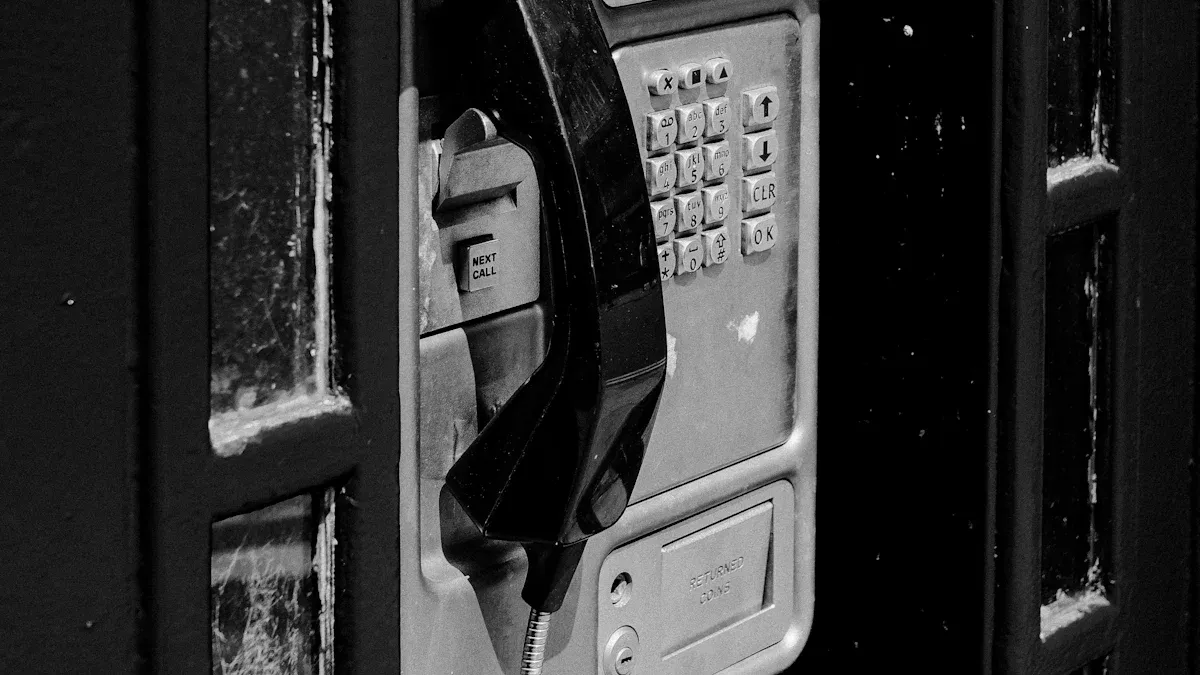
Industrial Heavy Duty telephones are robust communication tools specifically designed for challenging environments. These devices, including the IP Heavy Duty telephone, are built to withstand harsh conditions, ensuring uninterrupted communication where standard phones fail. Their significance is particularly evident in industries that prioritize safety and operational efficiency. For instance, the demand for waterproof Outdoor telephones is increasing at a 6% annual rate due to stricter safety regulations and innovative designs. Whether integrated into a station public telephone system or deployed in remote locations, these reliable solutions play a vital role in enhancing workplace effectiveness and meeting industry demands.
Key Features of an Industrial Heavy-Duty Telephone
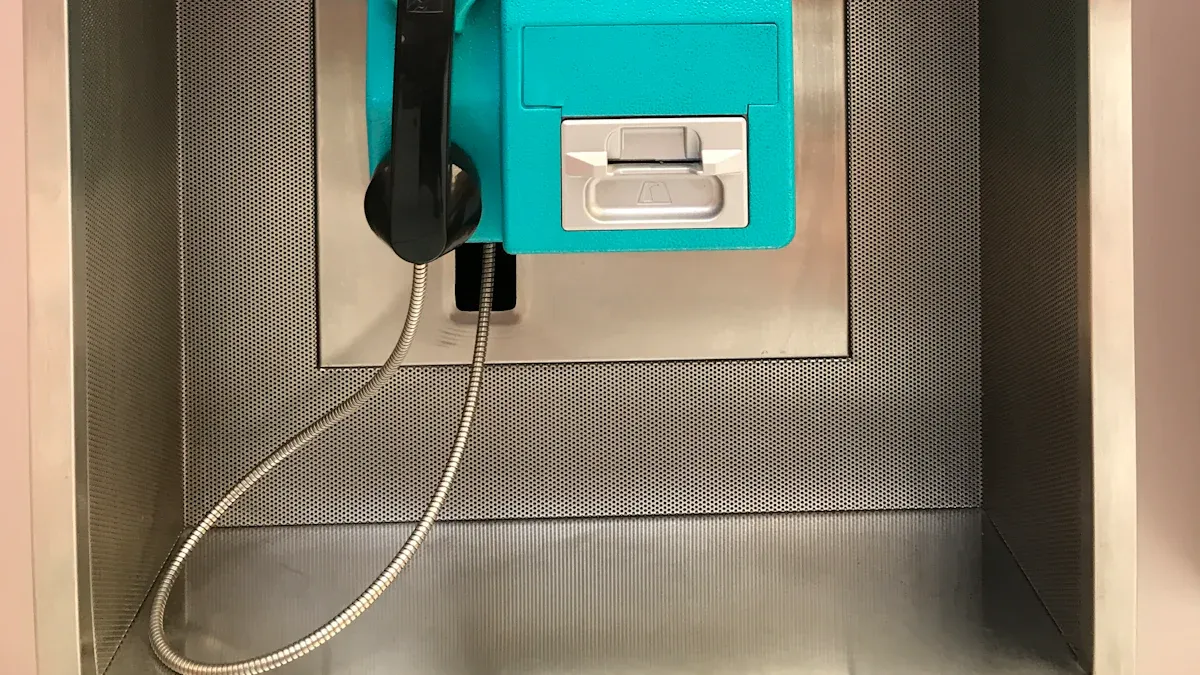
Durability and Impact Resistance
Industrial heavy-duty telephones are engineered to endure extreme physical stress, making them indispensable in rugged environments. These devices surpass standard communication tools in durability metrics, ensuring reliable performance even under harsh conditions. For instance, the Sonim XP10 demonstrates exceptional resilience, surviving drops from heights of 6.5 feet onto concrete and withstanding up to one ton of pressure.
Note: Devices like the Sonim XP8 undergo rigorous testing, including a 26-point drop test as per MIL-STD-810G standards, which assess impact resistance from all angles.
| Durability Metric | Sonim XP10 Value |
|---|---|
| Drop Resistance | Survives 6.5 ft drops on concrete |
| Water Resistance | Submersible up to 6.5 ft for 30 min |
| Impact Resistance | Withstands up to 4J impact energy |
| Pressure Resistance | Withstands up to one ton of pressure |
| Operational Temperature Range | -20°C to +55°C |
These robust features ensure that industrial heavy-duty telephones remain operational in environments where conventional devices fail, such as manufacturing plants, oil rigs, and mining sites.
Protection Against Environmental Hazards
Industrial heavy-duty telephones are designed to resist environmental hazards, including dust, water, and extreme temperatures. Their protective measures are validated through industry standards like the IP rating system. Devices with an IP65 rating, for example, offer protection against dust and water jets, making them suitable for outdoor and hazardous settings.
| Measurement/Rating | Description |
|---|---|
| MIL-STD 810G | A military standard that includes a drop test ensuring devices can withstand drops from four feet. |
| IP Rating | Ingress Protection rating that indicates the device’s resistance to solids and liquids. |
| IP65 | Minimum recommended rating for rugged devices, indicating protection against dust and water jets. |
Tip: Studies show that increased telecommunications infrastructure correlates with stricter environmental regulations, highlighting the importance of durable devices in promoting safety and compliance.
These protective features ensure uninterrupted communication in environments prone to extreme weather, chemical exposure, or heavy machinery operations.
Advanced Communication Functions
Industrial heavy-duty telephones integrate advanced communication technologies to enhance operational efficiency. Features like voicemail, caller ID, and call forwarding streamline communication processes, while Voice over Internet Protocol (VoIP) enables cost-effective long-distance calls. These systems also provide superior sound quality and adaptability, making them ideal for industries with dynamic needs.
The growing demand for advanced communication tools reflects their operational advantages. For example, Ty Inc., a leading soft toy manufacturer, transitioned to a cloud-based communication system, improving connectivity and gaining valuable data insights. This shift underscores how modern communication technologies can transform industrial operations.
Insight: Predictions indicate global spending on telecom services will increase by 1.4%, reaching $1,530 billion by 2024. This trend highlights the rising importance of advanced communication systems in industrial settings.
By incorporating these features, industrial heavy-duty telephones not only ensure reliable communication but also contribute to cost savings and improved workplace efficiency.
Applications of Industrial Heavy-Duty Telephones
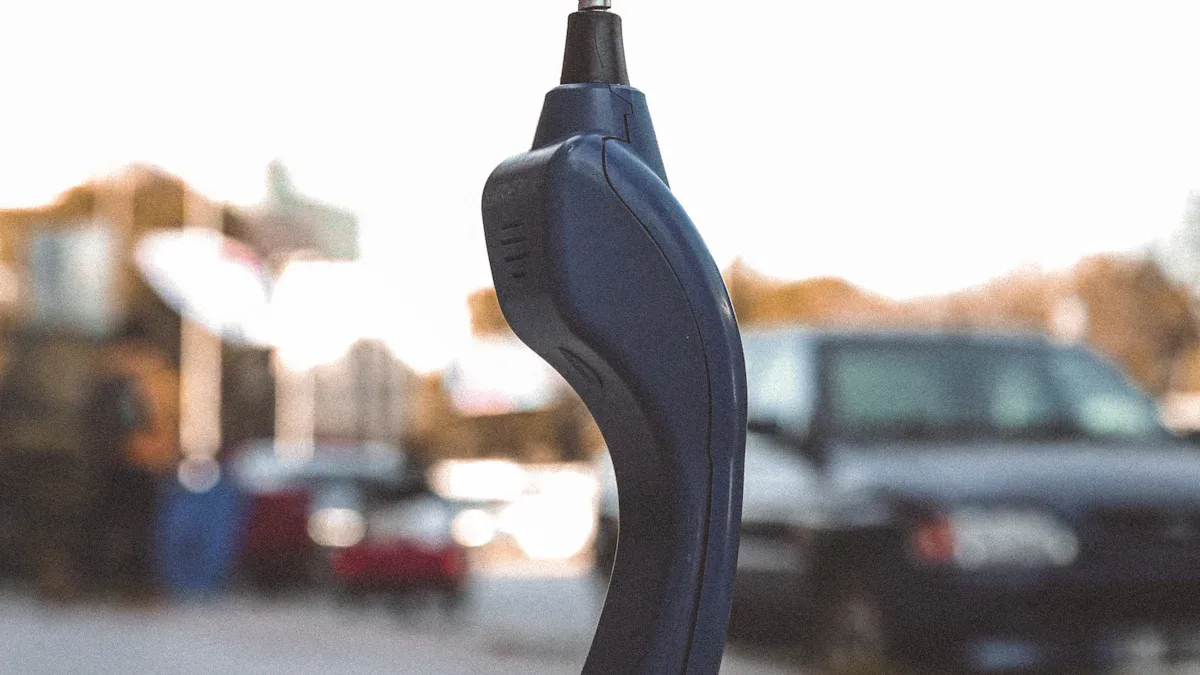
Manufacturing and Production Facilities
Manufacturing and production facilities often operate in environments filled with noise, dust, and vibrations. These conditions demand communication devices that can withstand such challenges. Industrial Heavy Duty telephones provide reliable communication in these settings, ensuring seamless coordination between teams. Their durability and resistance to environmental hazards make them ideal for factories where standard devices fail.
For example, in assembly lines, these telephones enable quick communication between operators and supervisors, reducing downtime caused by equipment malfunctions. Features like noise-canceling microphones and loudspeakers ensure clear audio, even in noisy environments. This reliability enhances productivity and minimizes operational disruptions.
Oil and Gas Operations
Oil and gas operations occur in some of the harshest environments, including offshore platforms and remote drilling sites. Communication in these settings is critical for safety and efficiency. Industrial Heavy Duty telephones play a vital role by providing robust and reliable communication solutions.
These devices contribute to operational improvements in several ways:
- They reduce reactive maintenance by 10-40%, as shown in the table below.
- They increase equipment availability by 2-5%.
- They lower inventory costs by 5-10%.
| Metric | Value Range |
|---|---|
| Reduction in reactive maintenance | 10-40% |
| Increase in availability | 2-5% |
| Inventory cost reduction | 5-10% |
"Seconds matter when there is a problem with equipment in the petroleum industry. However, an oil and gas SCADA system can respond faster than a human operator. For example, an automated shutdown protocol will minimize the environmental impact of a damaged pipeline."
Additionally, mobile devices used in oil and gas operations improve decision-making and reduce costs. They eliminate the need for physical travel to sites, enhancing collaboration and lowering environmental impact.
Mining and Quarrying
Mining and quarrying operations present unique challenges, including extreme temperatures, heavy machinery, and hazardous conditions. Industrial Heavy Duty telephones ensure reliable communication in these environments, enhancing safety and operational efficiency.
These devices are designed to withstand the physical and environmental stresses of mining sites. Quantitative comparisons highlight their impact on safety measures:
| Metric | Value |
|---|---|
| Insertion Loss (Linsertion) | 22 dB |
| Cmode | 1.4 dB/100 ft |
| Cwall | 0.2 dB/100 ft |
| Ctilt | 1.2 dB/100 ft |
| Path Loss at 1,000 ft | 72 dB |
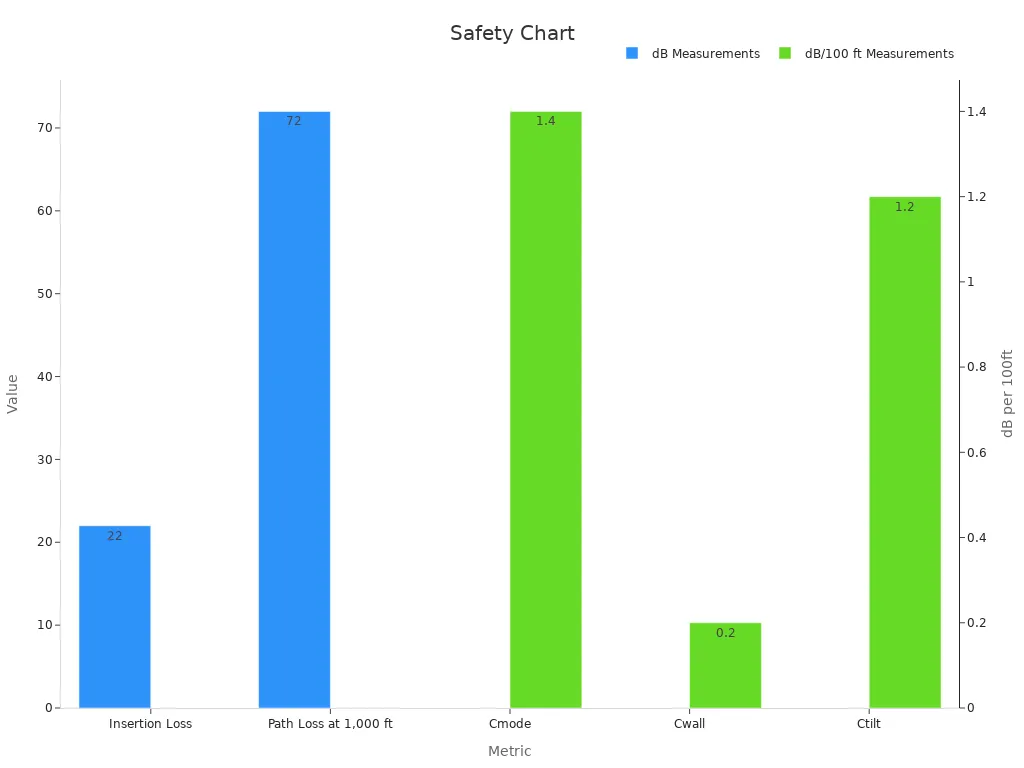
These metrics demonstrate how rugged communication devices improve safety and reliability in mining operations. By ensuring clear communication, they help prevent accidents and coordinate emergency responses effectively.
Public Safety and Emergency Services
Public safety and emergency services rely on uninterrupted communication to save lives and protect property. Industrial Heavy Duty telephones provide the reliability and durability needed in critical situations. These devices are often used in fire stations, police departments, and emergency response centers.
Their advanced features, such as VoIP and call forwarding, enable seamless communication across multiple teams. In disaster scenarios, these telephones ensure that first responders can coordinate effectively, even in adverse conditions. Their resistance to environmental hazards, such as water and dust, makes them indispensable tools for emergency services.
Why Industrial Heavy-Duty Telephones Are Essential
Enhancing Workplace Safety
Industrial Heavy Duty telephones play a critical role in improving workplace safety. These devices ensure reliable communication during emergencies, enabling workers to report incidents or hazards promptly. In high-risk industries like mining and oil extraction, quick communication can prevent accidents and save lives. Features such as noise-canceling microphones and durable construction allow these telephones to function effectively in noisy and hazardous environments. Their ability to withstand extreme conditions ensures they remain operational when needed most, reducing risks and enhancing overall safety protocols.
Tip: Regular maintenance of communication devices further enhances their reliability, ensuring they perform optimally during critical situations.
Ensuring Reliable Communication in Critical Operations
Reliable communication is essential for industries operating in extreme environments. Industrial Heavy Duty telephones provide consistent performance, even in conditions that would render standard devices inoperable. Their advanced features, such as Voice over Internet Protocol (VoIP) and integration with IoT systems, enable seamless communication across teams. This reliability ensures that critical operations, such as equipment monitoring and emergency responses, proceed without interruptions. By maintaining clear communication channels, these devices help industries avoid costly downtime and operational delays.
Boosting Efficiency in Harsh Environments
Industrial Heavy Duty telephones significantly enhance efficiency in challenging environments. Their rugged design minimizes device failures caused by environmental stressors, ensuring uninterrupted communication. Companies using these devices report a 45% improvement in response time, highlighting their impact on operational efficiency. Additionally, their integration with IoT systems allows organizations to collect and analyze data more effectively. The table below illustrates the benefits of these devices in harsh environments:
| Evidence Type | Description |
|---|---|
| Durability and Reliability | Up to 70% of workers in construction report device failures due to environmental stressors. |
| Efficiency in Communication | Companies using rugged smart devices have seen a 45% improvement in response time. |
| Integration with IoT | 92% of organizations with an IoT strategy utilize rugged smartphones for data collection. |
These features make industrial Heavy Duty telephones indispensable tools for industries aiming to optimize performance in demanding conditions.
Industrial Heavy Duty telephones remain vital for industries operating in extreme environments. Their rugged design ensures reliable communication, enhancing safety and operational efficiency. Across sectors, their adoption reflects their indispensable value. For instance, the construction industry accounts for 60% of rugged phone sales due to their IP67 ratings, while the oil and gas sector benefits from satellite connectivity for remote operations.
| Sector | Percentage of Rugged Phone Sales | Key Features |
|---|---|---|
| Construction Industry | 60% | IP67 ratings for dust and water resistance, ideal for tough job sites. |
| Manufacturing Sector | 25% | Durability against vibrations and drops, minimizing replacement costs. |
| Oil and Gas Industry | 20% | Satellite connectivity for remote communication in extreme weather. |
| Logistics and Warehousing | 15% | Reliable communication for inventory tracking and shipping updates. |
| Public Safety Agencies | 10% | Push-to-talk functions for immediate communication in emergencies. |
| Utility Companies | 5% | Used by field workers for maintenance tasks under challenging conditions. |
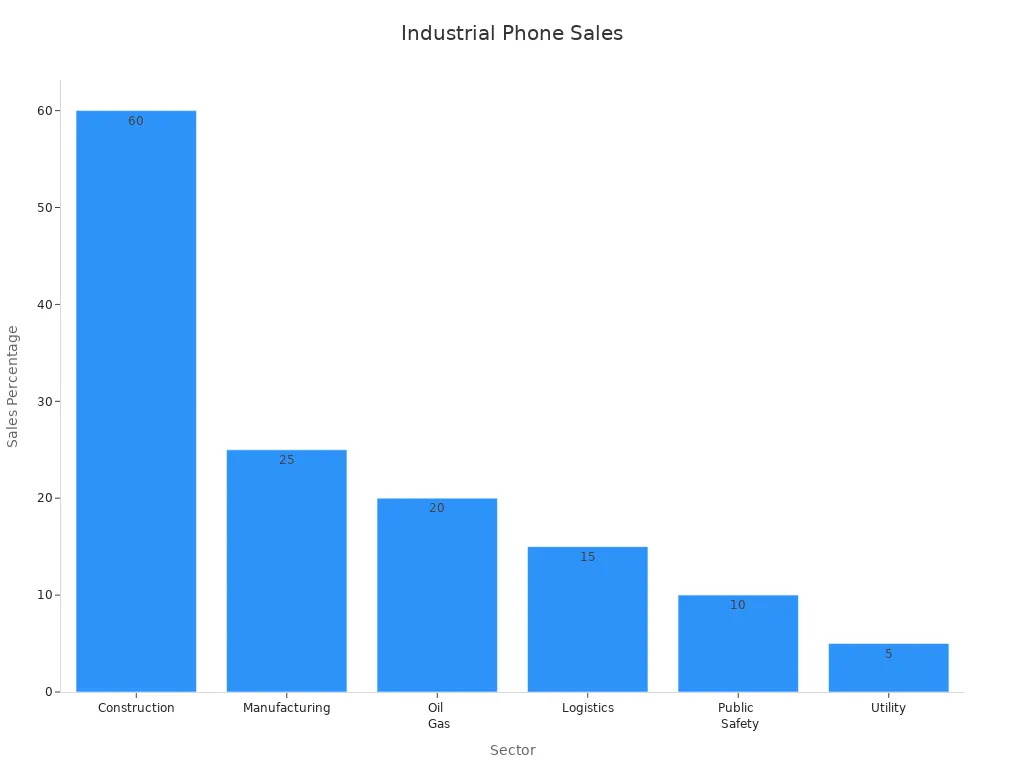
These devices not only improve workplace safety but also reduce downtime and replacement costs. Their advanced features, such as push-to-talk and satellite connectivity, make them indispensable tools for industries facing harsh conditions.
FAQ
What makes industrial heavy-duty telephones different from standard phones?
Industrial heavy-duty telephones feature rugged designs, enhanced durability, and resistance to environmental hazards, ensuring reliable communication in extreme conditions where standard devices fail.
Can industrial heavy-duty telephones integrate with modern communication systems?
Yes, these devices support advanced technologies like VoIP and IoT integration, enabling seamless connectivity and efficient communication across industrial operations.
Are industrial heavy-duty telephones cost-effective for businesses?
Their durability reduces replacement costs, while advanced features improve operational efficiency, making them a valuable investment for industries operating in harsh environments.


